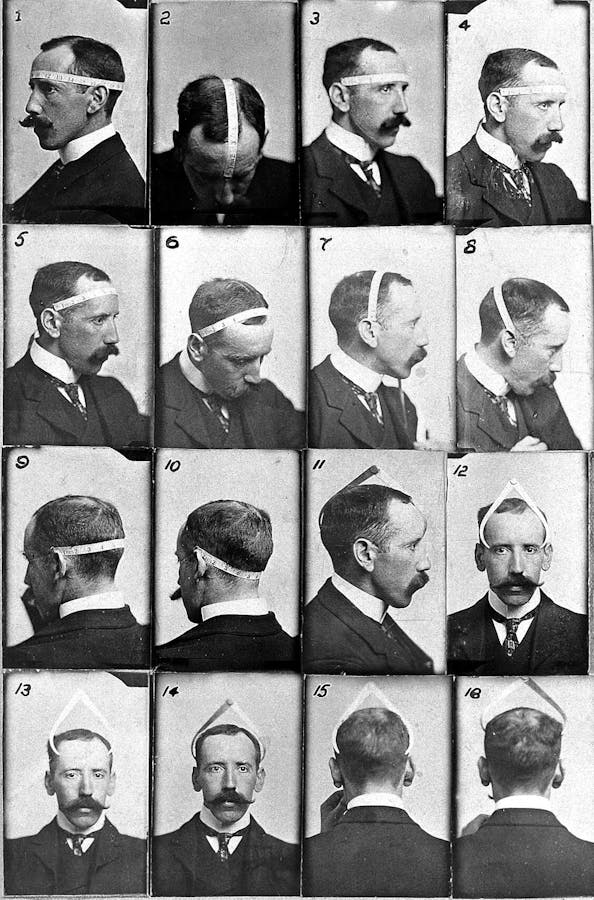Are future utopias possible? Just how far can one get to creating heaven on earth?
According to the Bible, a new age of human flourishing will ultimately be brought about by God. Some, however, have argued that advances in science and technology will eventually solve all the world’s problems.
Others, including both believers and nonbelievers, have critiqued the practicality of these schemes and even the very notion of scientific progress, with some believers arguing that human sin places scientific utopias out of reach. Efforts to create heaven on earth over the past century have brought these issues to bear, often with tragic results.

English psychiatrist Bernard Hollander was such a proponent of phrenology, the now debunked study of the human skull to predict a person’s mental and physical traits, that he created his own system of measurement.
The phrenologist Bernard Hollander illustrated with his own head his system of cranial measurements. Photographs, c. 1902. Wellcome Collection.
Today, the science of “eugenics” (meaning “well born”) has been thoroughly discredited. However, at the turn of the twentieth century, some of the world’s leading scientists viewed it as a cutting-edge field of study that could dramatically improve humanity.
The eugenics movement, steeped in class prejudice and racism, was an effort to breed “superior” human beings, in part by applying certain principles of natural selection. Supporters encouraged people with “desirable” traits to reproduce while imposing immigration restrictions, compulsory sterilization laws, and other measures on those deemed “unfit,” typically the poorest and most marginalized communities.
Although inspired by secular science, eugenicists sometimes co-opted biblical language when describing their future utopia. According to University of Virginia anatomist Harvey Jordan, eugenics could create a “kingdom of heaven on the earth.”
“The Garden of Eden is not in the past, it is in the future.”
Albert Edward Wiggam, The Fruit of the Family Tree, 1924
The eugenics movement declined after World War II as the world came to grips with the Holocaust and the scientific community embraced new evidence.
Some of the most profound critics of eugenics reflected a biblical worldview, arguing that it violated human dignity and even usurped God’s authority.
Those who formerly turned to God to find solutions for their problems turned to science and technology, convinced that they now possessed the instruments needed to usher in the new society. . . . Now we have come to see that science can give us only physical power, which, if not controlled by spiritual power, will lead inevitably to cosmic doom.”
Martin Luther King Jr., “The Man Who Was a Fool,” 1961

English psychiatrist Bernard Hollander was such a proponent of phrenology, the now debunked study of the human skull to predict a person’s mental and physical traits, that he created his own system of measurement.
The phrenologist Bernard Hollander illustrated with his own head his system of cranial measurements. Photographs, c. 1902. Wellcome Collection.
Today, the science of “eugenics” (meaning “well born”) has been thoroughly discredited. However, at the turn of the twentieth century, some of the world’s leading scientists viewed it as a cutting-edge field of study that could dramatically improve humanity.
The eugenics movement, steeped in class prejudice and racism, was an effort to breed “superior” human beings, in part by applying certain principles of natural selection. Supporters encouraged people with “desirable” traits to reproduce while imposing immigration restrictions, compulsory sterilization laws, and other measures on those deemed “unfit,” typically the poorest and most marginalized communities.
Although inspired by secular science, eugenicists sometimes co-opted biblical language when describing their future utopia. According to University of Virginia anatomist Harvey Jordan, eugenics could create a “kingdom of heaven on the earth.”
“The Garden of Eden is not in the past, it is in the future.”
Albert Edward Wiggam, The Fruit of the Family Tree, 1924
The eugenics movement declined after World War II as the world came to grips with the Holocaust and the scientific community embraced new evidence.
Some of the most profound critics of eugenics reflected a biblical worldview, arguing that it violated human dignity and even usurped God’s authority.
Those who formerly turned to God to find solutions for their problems turned to science and technology, convinced that they now possessed the instruments needed to usher in the new society. . . . Now we have come to see that science can give us only physical power, which, if not controlled by spiritual power, will lead inevitably to cosmic doom.”
Martin Luther King Jr., “The Man Who Was a Fool,” 1961











